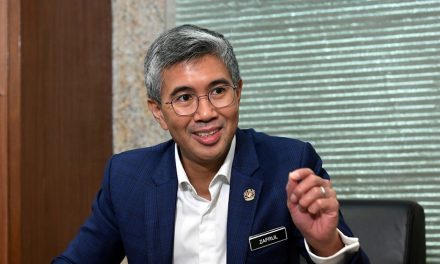The Malaysian economy is now on the path to recovery supported by the reopening of more economic sectors and it is estimated to chart better growth for 2022, said Finance Minister Tengku Datuk Seri Zafrul Abdul Aziz.
He said the prospects for an economic upswing will be better next year although Bank Negara Malaysia has revised its full-year 2021 gross domestic product (GDP) growth forecast to between 3 percent and 4 percent, from the previous forecast of between 6.5 percent and 7.5 percent — no thanks to the re-imposition of the lockdown measures in June this year.
“We see the reopening of the economy and we expect this to support gradual recovery in the fourth quarter of this year. As soon as we have seen the economy slowly being opened up, and hence, of course from the (pick-up from) external demand and ramp-up in commodity production… there is also pent-up demand and continued investment in large scale infrastructure projects following the lifting of restrictions, so the recovery is expected to accelerate further into 2022,” Tengku Zafrul said at a national recovery summit webinar yesterday.
He cited studies done by the World Bank and the International Monetary Fund (IMF), which projected the country’s 2022 GDP to grow at 5 percent and 6 percent respectively supported by a gradual normalisation of economic activities, as well as the positive spill over from continued improvement in external demand.
Notwithstanding that, Tengku Zafrul said Malaysia’s economic recovery is intertwined with the government’s efforts in managing the Covid-19 pandemic and much will hinge on the speed of the vaccination programme, how intensive care unit (ICU) utilisation progresses as well as the emergence of newer variants of the virus.
On some of these fronts, he said Malaysia is seeing promising progress.
“Malaysia is currently one of the fastest nations in administering vaccines, it has reached more than 400,000 daily. As I mentioned in my speech earlier, 89 percent of Malaysia’s adult population received their first dose of vaccination, and [at] the current rate, it is expected that 80 percent of the nation’s adult population will be vaccinated by end-September, where we will start treating Covid-19 as endemic in October, when it (vaccination rate for adult population) gets to 100 percent.
“Consequently, we have also seen our hospitalisation and ICU rates stabilise in recent weeks,” he noted.
“So, my point here is that there is a need for us to balance our lives and livelihoods. But as we slowly address the issue of our healthcare capacity, we are at the same time, in parallel, reopening in stages, systematically and saving the economy,” he stressed.
Against this backdrop, Tengku Zafrul is hopeful that Malaysia’s economy will show signs of positive economic growth this year, and post stronger growth next year as predicted by the IMF and the World Bank.
He said the government will progressively update the National Recovery Plan (NRP) to prepare the country for the next phase of living with Covid-19 as an endemic.
“Without a doubt, Covid-19 has shown that public healthcare is an important foundation to enable other sectors to operate.
“As such, we will not compromise on what is required to place our public healthcare on a stronger footing, through the NRP, and later through Budget 2022,” he added.
Beyond the pandemic, Tengku Zafrul said the government is studying efforts to strengthen the healthcare system’s resilience and preparedness for future pandemics while meeting the longer-term challenges of an ageing population and non-communicable diseases.
Policy measures being studied include putting in place an “always on” system during pandemics and the strengthening of mechanisms to detect infectious diseases to stop transmissions at an early stage.
“Such reforms will ensure the protection of lives and livelihoods while keeping the economy open for business,” he said.
**This article was first published in The Edge Markets.










